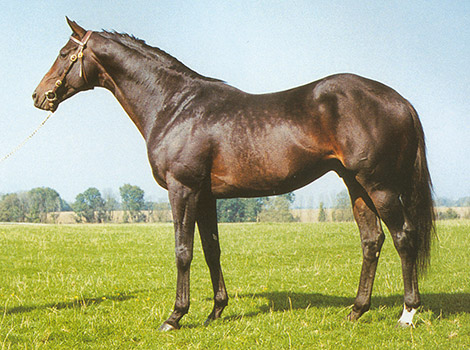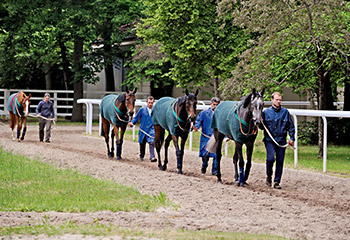

This was the year in which he undertook the planning and development of the training centre at Aiglemont on the outskirts of Gouvieux, a neighbour village to Chantilly. One hundred and eight boxes, divided into six barns, are situated in a wonderfully tranquil atmosphere. It is an ideal setting to train horses that perform their daily exercise on gallops that are known by the name "Les Aigles".
In quick succession the Aga Khan made two substantial purchases - the Dupré and the Boussac bloodstocks. The infusion of these outcrosses soon made their mark on the racetrack. The Aga Khan’s band of broodmares swelled from 75 in 1977 to 164 in 1980. That total is now considered to be the optimum number for the stud. After this increase in numbers the decision was made to resume racing in England. In 1978, yearlings were sent to Sir Michael Stoute in Newmarket and Fulke Johnson-Houghton at Blewbury. There was an early return from the Dupré investment with Top Ville - twice a Group winner in his first season - training on well from two to three years to win the Prix du Jockey Club.
The last of the great winners trained by François Mathet was the three-year-old filly Akiyda who, a few months before her trainer’s death, carried off the 1982 Prix de l’Arc de Triomphe. Yves Saint-Martin sent her to the front a quarter of a mile from home but had to face a series of challenges launched by Awaasif, April Run and finally Ardross. She battled with great heart and held off Ardross by a head. Akiyda was bred by the Aga Khan from bloodlines originated by Marcel Boussac, being by Labus out of the Abdos mare Licata who traces to Tourzima.
Other fine fillies bred and raced by the present Aga Khan include his six Prix de Diane winners Shemaka, Vereva, Zainta, Daryaba, Zarkava and Sarafina, the Classic winners Masarika, Zalaiyka, Ebadiyla, Shawanda and Kastoria and the Group One winners Sharaya, Darara, Behera, Timarida, Edabiya, Shamdala, Rosanara, Shalanaya and Daryakana. Out of all these, Daryakana stems from a Boussac family and Sarafina descends from a Dupré line.
The offering of the mare Miss Melody at the 1976 Newmarket December Sales enabled the Aga Khan to buy into the family that had produced St. Paddy, Great Nephew and Northern Dancer’s sire, Nearctic. Mated with Thatch, the resulting produce, Masarika, won three times in her first season, including the Prix Robert Papin. The following year she slipped through a late opening to win a very fast run Poule d’Essai des Pouliches by a length from Boreale. Shemaka, from the Shahrastani family that had its roots in Pale Ale, gave the Aga Khan his first Prix de Diane win by beating Baya by a short head. He has since won the Prix de Diane three times in succession, with Vereva in 1997, Zainta in 1998 and Daryaba in 1999, as well as in 2008 with Zarkava in 2010 with Sarafina and in 2012 with Valyra. His Highness holds the record for leading owner in this race.
Sharaya on the dam’s side was a great granddaughter of the Derby winner St. Paddy and traced to Éclair. Her 1983 Prix Vermeille victory was achieved the hard way with Yves Saint-Martin making all the running and still having enough in reserve to fend off Estrapade by two lengths. Darara’s margin of success in the Prix Vermeille of 1986 was more emphatic as she took the lead early in the straight and kept extending it all the way to the finish over Reloy. The five-length verdict remains unequalled by any Prix Vermeille winner in the last twenty-five years. Darara’s dam Delsy was amongst the Boussac mares and two years earlier she bred the Prix du Jockey Club winner Darshaan for the Aga Khan.